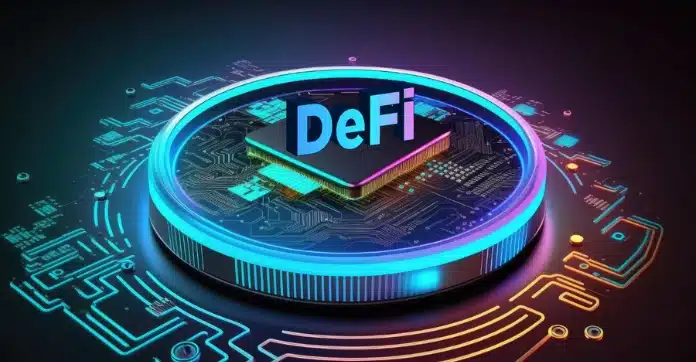
In the world of finance, decentralized finance or DeFi, is changing how we handle money and transactions. Imagine a shift where we are not tied to traditional ways of banking. DeFi does just that. It is like a financial revolution that uses blockchain technology to offer all sorts of finance services like lending, borrowing, trading, and more without intermediaries. It means no more barriers, lower costs, and access to tools that used to be just for a select few. DeFi is not controlled by a single entity like banks or governments; it is decentralized. It makes things clear and secure, and it is also a way for people left out of the usual financial systems to join in. So, get ready to explore DeFi and how it might change finance as we know it.
The Core Principles of DeFi
Let’s explore the core ideas that shape the exciting world of Decentralized Finance (DeFi):
- DeFi works using computers connected in a unique way that does not need intermediaries like banks. Users have more control over their money and how they use it.
- DeFi is like an open book; its rules are there for everyone to see. People can suggest changes or new ideas. This teamwork makes DeFi better and more creative.
- Think of DeFi like a team where different parts work together smoothly. It makes it easy to do different things in one place, which is super handy.
- DeFi uses technology that makes every money move visible. It is like a record that shows where money goes. It helps users make sure everything is right.
- DeFi is like an open door for everyone with internet. It is not limited like old money systems. Therefore, more people can be part of activities.
- Smart contracts are like helpful robots. They follow rules set by users and make things happen automatically. It saves time and cuts out extra steps.
- DeFi has special pools where people invest their money. These pools help everything work better. It is like a team effort for money.
- The DeFi world is constantly changing. New ideas and things to do with money pop up all the time. It is like a playground of new stuff to try.
- While DeFi is exciting, safety is super important. Smart contract checks, groups that make decisions together, and rules set by the community all keep users’ money and information safe.
How Exactly Does DeFi Work?
DeFi uses blockchain technology to provide a new viewpoint on traditional financial institutions. Instead of relying on centralized institutions, DeFi functions on a network of networked computers aided by smart contracts. These automated contracts with established rules eliminate the need for intermediaries. Consider the case when you want to lend or earn interest. In the world of DeFi, you would put your money into a platform driven by smart contracts. This operation creates a liquidity pool from which other users can borrow funds. The smart contract effortlessly oversees the interest paid by borrowers and earned by lenders, ensuring openness and accuracy.
What Are the Benefits of DeFi?
DeFi offers a range of advantages, spanning improved financial inclusivity and reduced reliance on intermediaries. It hands individuals the reins to their assets and opens the door to various services. Let us uncover the benefits of DeFi –
- Accessibility
DeFi transforms finance with decentralized, blockchain-powered options. It grants users access to services like lending, borrowing, and trading, all while maintaining control over their assets—the removal of intermediaries results in lower fees and faster processes, promoting financial inclusivity. The transparency of DeFi encourages innovation and collaboration, fostering the creation of innovative solutions such as online Ethereum casinos. However, users should exercise caution due to the evolving landscape and associated risks. Ultimately, DeFi reshapes the financial landscape, giving individuals more control and paving the path for a more accessible and fair financial future.
- Reduced Counterparty Risk
The decentralized design of DeFi reduces counterparty risk by removing the requirement for intermediaries. Conventional financial transactions frequently necessitate trust in a third party, leaving users vulnerable to potential defaults or fraudulent activities. In DeFi, transactions unfold directly between users using smart contracts, guaranteeing the automatic fulfillment of agreed-upon conditions.
- Financial Inclusion
DeFi spearheads unparalleled financial inclusion by expanding its services to underserved populations across the globe. With its open and borderless nature, DeFi transcends conventional obstacles, granting individuals with internet access the ability to tap into financial resources. This transformation significantly impacts the unbanked or underbanked, who are often excluded from conventional systems.
- Innovation
DeFi is a fertile ground for innovation, molding financial horizons with state-of-the-art solutions. Harnessing the potential of decentralized networks and intelligent contracts, DeFi pioneers fresh pathways for lending, yield farming, and asset management. This process of evolution acts as the fuel for ingenuity, birthing distinctive financial offerings that challenge conventional norms. By embracing the ethos of open-source collaboration, DeFi beckons developers to collaborate and contribute to existing platforms, instigating a swift cycle of enhancements.
Conclusion
DeFi emerges as a transformative force in a landscape brimming with financial prospects. It redefines the core meaning of finance through decentralization, ushering in a domain of loan, trading, and beyond while eliminating reliance on intermediaries. Nonetheless, when we enter this intriguing realm, care is essential. The rapid expansion of DeFi raises dangers such as smart contract weaknesses and regulatory difficulties. Despite these hazards, the potential for DeFi to effect positive change cannot be emphasized. DeFi actively contributes to a more efficient financial environment by optimizing processes and eliminating geographical barriers. The exploration into DeFi promises to transform finance as we know it, moving us towards a future marked by decentralization and empowered financial control.